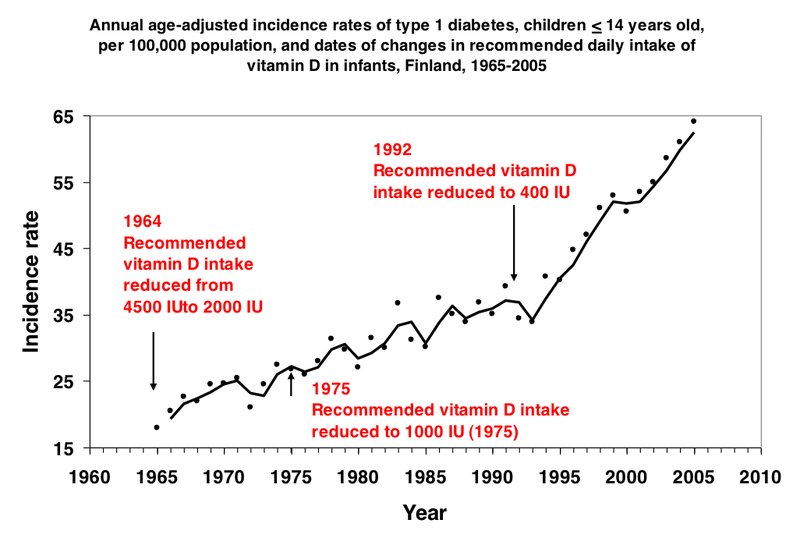While I used to think otherwise, I firmly believe that nursing mothers should supplement both themselves and their babies with Vitamin D. The exceptions to this are mothers who live south of Atlanta, who together with their babies are out of doors without sunscreen between 11:00 am and 1:00pm and who don’t use soap when they wash (because it washes away the D2 oil involved in the process of making D3.) We used to have government programs to encourage parents to take children out into the sun. See this informative and entertaining video from UCSD.
In Finland, babies were routinely given cod liver oil providing 4500 iu of D (and modern cod liver oil is NOT recommended for it due to lower D/A ratios). Then, since research showed that rickets could be prevented at 400 iu, the recommended daily amount was lowered. As a result, Type 1 Diabetes skyrocketed. We have very good data showing that 90% of Type 1 Childhood Diabetes can be eliminated by Vitamin D supplementation.

The link between Vitamin D and Type 2 diabetes in children is less supported but there is good evidence that it may also play a role.
Vitamin D deficiency may also play a role in some autism. The blood levels of Vitamin D in autistics is generally low.
Vitamin D Council’s John Cannell, MD, (http://www.vitamindcouncil.org/health/autism/ is convinced that vitamin D deficiency is linked to autism and that the autism “epidemic” started at the exact same time that the vitamin D deficiency epidemic started. As soon as we started limiting sun exposure and using sunscreens, the number of autism cases shot up. Science Magazine published a similar article. There are groups of Somali children in Sweden and Minnesota who are hugely overrepresented among autistics, with the only real difference between their lighter skinned peers is that their skin color prevents Vitamin D absorption. It is correlation, but is compelling.
I have here a number of articles on Vitamin D and its health benefits. While theoretical toxicity is a potential problem, it is hard to get high enough to be toxic. And since 13,000 Finnish babies managed on 4500 iu, then we have good evidence that isn’t so high.
While it is very important that a pregnant or nursing mother have high D levels, it isn’t easy to do that from diet alone. Most of us drink less milk, eat less liver or organ meat, don’t go out into the sun around noon without sunscreen and we wash the oils off of our skin that might be turned into the vitamin. We are also heavier, which reduces Vitamin D. Our foods used to have a lot more D: cattle grazed in the sunlight foraging for wild plants, wild fish ate plankton instead of Purina fish meal, and pigs and chickens weren’t penned indoors. The supplementation of Vitamin D from irradiated milk is insufficient to make up for the loss. And your prenatal vitamins won’t have enough because the RDA is too low.
If your skin is dark, chances are that your D levels are low. The National Health and Nutrition Examination Survey) found African Americans were low: just 3 percent of blacks sampled in 2004 were found to have the recommended levels compared with 12 percent two decades ago. If you don’t have it, you can’t pass it through your milk. Breastfed infants have been taken away from nursing African American mothers on suspicion of abuse because they had hidden fractures from rickets and were not tested for them. Since we are out of our ecological niche, we no longer have the natural sources of Vitamin D at our disposal and we probably need to supplement.
I would personally take 10,000 iu during pregnancy and lactation, more if I had conditions that reduce Vitamin D like dark skin, autoimmune disease, diabetes or obesity. I would personally give my baby 2000 iu, and would massage in a D-supplemented skin oil (even if I had to add it in myself.) We would both spend time in the noonday sun without sunscreen. And just to be safe, I would ask for 25-hydroxy-D blood tests to make sure I was getting it high enough.
Research on D in Pregnancy and Lactation from the Vitamin D Council.
